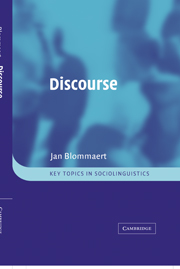Book contents
- Frontmatter
- Contents
- Preface
- Acknowledgments
- 1 Introduction
- 2 Critical Discourse Analysis
- 3 Text and context
- 4 Language and inequality
- 5 Choice and determination
- 6 History and process
- 7 Ideology
- 8 Identity
- 9 Conclusion: Discourse and the social sciences
- Notes
- Appendix: English translations of the documents in chapter 5
- Glossary
- References
- Index
3 - Text and context
Published online by Cambridge University Press: 02 December 2009
- Frontmatter
- Contents
- Preface
- Acknowledgments
- 1 Introduction
- 2 Critical Discourse Analysis
- 3 Text and context
- 4 Language and inequality
- 5 Choice and determination
- 6 History and process
- 7 Ideology
- 8 Identity
- 9 Conclusion: Discourse and the social sciences
- Notes
- Appendix: English translations of the documents in chapter 5
- Glossary
- References
- Index
Summary
Introduction: context is/as critique
Critical trends in discourse analysis emphasise the connection between discourse and social structure. They locate the critical dimension of analysis in the interplay between discourse and society, and suggest ways in which features of social structure need to be treated as context in discourse analysis. For instance, in analysing doctor–patient interaction, the facts that one participant is a doctor and another is a patient, and that this interaction consequently develops in an institutional environment, are crucial elements in understanding the power balance in that interaction. There will be a particular power dynamic because one is a doctor and another is a patient, and because this turns the particular interaction into an instance of an institutionalised genre. Critical analysis is thus always and necessarily the analysis of situated, contextualised, language, and context itself becomes a crucial methodological and theoretical issue in the development of a critical study of language.
There is a vast and significant literature on context (see, for example, Auer and Di Luzio, 1992; Duranti and Goodwin 1992; Auer 1995), and the most general way of summarising it is to say that it addresses the way in which linguistic forms – ‘text’ – become part of, get integrated in, or become constitutive of larger activities in the social world (see also Scollon 2001). To some extent, this is self-evident: language is always produced by someone to someone else, at a particular time and place, with a purpose and so forth.
- Type
- Chapter
- Information
- DiscourseA Critical Introduction, pp. 39 - 67Publisher: Cambridge University PressPrint publication year: 2005
- 1
- Cited by

